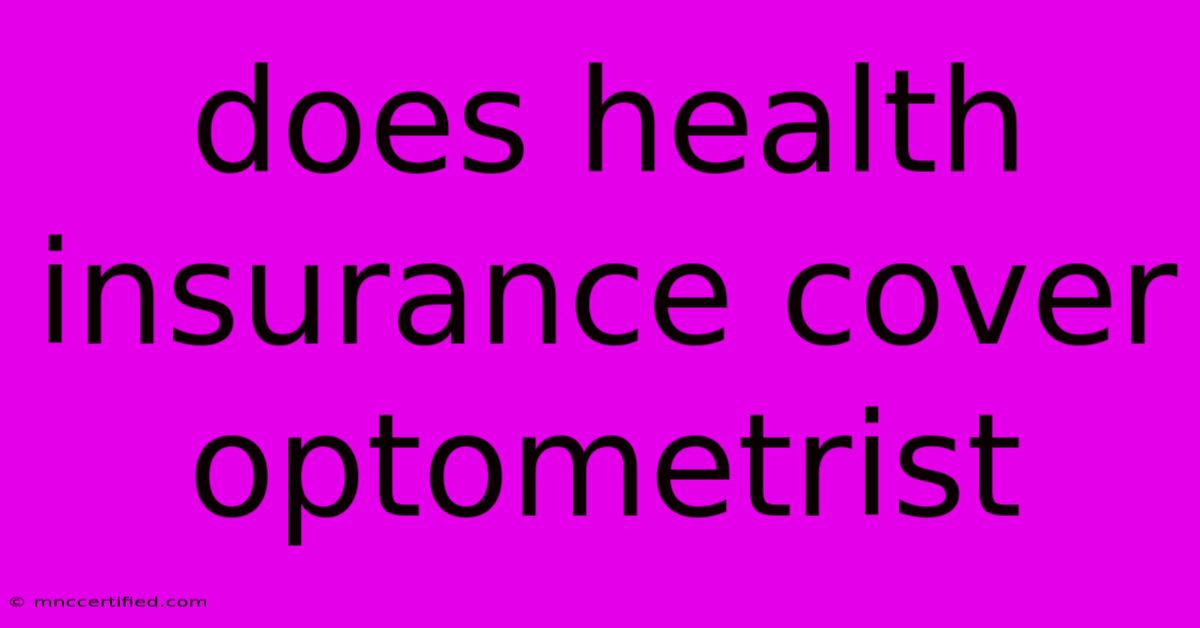Does Health Insurance Cover Optometrist

Table of Contents
Does Health Insurance Cover Optometrist Visits? A Comprehensive Guide
Seeing clearly is essential for a healthy and fulfilling life. But with the cost of healthcare rising, many wonder if their health insurance covers optometrist visits and eye care. This article provides a comprehensive guide to help you understand how health insurance works in relation to eye care.
The Short Answer: It Depends.
While some health insurance plans do cover optometrist visits and eye exams, others may not. The coverage you receive depends on several factors, including:
- Your specific health insurance plan: Different plans offer varying levels of coverage.
- Your insurance provider: Some insurance companies have more generous eye care benefits than others.
- Your age: Certain age groups may have more comprehensive coverage for eye care.
- Your location: State laws and regulations can influence the coverage you receive.
Understanding Your Health Insurance Policy
The best way to determine whether your health insurance covers optometrist visits is to carefully review your policy documents. Pay close attention to the following sections:
- Benefits: Look for sections outlining your coverage for vision care, eye exams, and prescription eyewear.
- Deductibles and co-payments: Understand the out-of-pocket costs you'll incur for each covered service.
- Limitations: Be aware of any restrictions on the frequency of visits or types of eye care services covered.
Common Coverage Scenarios
- Vision Care Plans: These plans specifically focus on eye care and may include coverage for eye exams, contact lens fittings, and prescription eyeglasses.
- Health Maintenance Organizations (HMOs): Some HMOs may offer limited vision care benefits as part of their primary care coverage.
- Preferred Provider Organizations (PPOs): PPOs typically offer greater flexibility in choosing your optometrist, but may have higher co-payments.
- Employer-Sponsored Plans: Coverage for eye care can vary significantly between employer-sponsored plans.
Beyond Routine Eye Exams
While most insurance plans cover basic eye exams, additional services like corrective laser surgery, eye disease treatment, or specialized lenses might require separate coverage or pre-authorization. Be sure to discuss your needs and potential costs with your optometrist and your insurance provider.
Finding Affordable Eye Care
If your health insurance doesn't cover all your eye care needs, consider these options:
- Vision Discounts: Look for vision discount programs offered by organizations like AARP or AAA.
- Contact Lens Subscription Services: Some companies offer affordable monthly subscriptions for contact lenses.
- Financial Assistance: Ask your optometrist about financial assistance programs or payment plans.
- Shop Around: Compare prices and services offered by different optometrists in your area.
Conclusion
While navigating the complexities of health insurance coverage can be frustrating, understanding your policy and exploring your options will help you access affordable and quality eye care. Remember, good vision is an essential part of overall health and wellbeing, and it's important to invest in its maintenance.

Thank you for visiting our website wich cover about Does Health Insurance Cover Optometrist. We hope the information provided has been useful to you. Feel free to contact us if you have any questions or need further assistance. See you next time and dont miss to bookmark.
Featured Posts
-
Insurance Companies Gainesville Georgia
Nov 08, 2024
-
Herbstreits Dog Ben Passes Away Emotional Post
Nov 08, 2024
-
Insurance Companies In Hendersonville Nc
Nov 08, 2024
-
Advanced Wellness 100a Insurance Reviews
Nov 08, 2024
-
Sancho Injury Update Chelsea Return Timeline
Nov 08, 2024